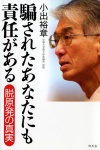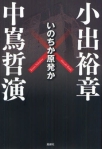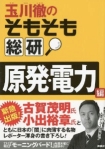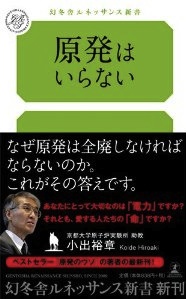2011年7月19日、The Washington Postに小出裕章氏に関する記事が掲載されていました。コメント欄にて、茲愉有人さま、千葉ニュータウン在住Ms.さまなど多数に人に教えていただきました。
以下、The Washington Post「In Japan, nuclear bestsellers reflect new debate – The Washington Post」の訳出。
=====
In Japan, nuclear bestsellers reflect new debate
By Chico Harlan, Tuesday, July, 19
日本では、「核」のベストセラーが新たな論争を映しだしている
チコ・ハーラン 7月19日火曜日
TOKYO — A Japanese nuclear researcher with a four-decade track record of activism and obscurity was walking through Kansai International Airport a few weeks ago when he spotted a display of bestsellers at a bookstore. Glancing down, he saw his latest book, “The Lie of Nuclear Power,” with his face emblazoned on a corner of the cover.
東京ー40年にわたって人知れずしかし積極的に活動の歴史を刻んできた一人の原子力研究者が、つい数週間ほど前に関西国際空港の中を歩いていた。そのとき彼はある書店でベストセラーの展示を見つけた。ちらりと目を下ろしてみると、そこにあったのは、彼の顔が表紙の隅を飾るその最新の著作「原発のウソ」だった。
For Hiroaki Koide, the moment confirmed a shift — that of a fringe interest turning mainstream. Four months into the most severe nuclear crisis in a quarter-century, while Japan’s bureaucrats and power industry chiefs tussle over nuclear energy policy, at least one industry has raced to make wholesale adjustments. Publishers are releasing books about nuclear power at the rate of more than one a day, according to bookselling Web sites, begging for content from authors who once wondered why they had so few readers.
小出裕章にとって、それは変化を確信した瞬間だった。その変化とは、これまで人々の関心の範囲外だったものが主たる関心事になろうとしていることだ。日本の官僚たちと電力業界の責任者たちが核エネルギー政策を巡って激闘するなか、少なくとも一つの産業が、大規模な適応を急速になし遂げた。出版社は1日につき1冊を超える割合で核に関する本を出版し続けていると、書籍販売のウエブサイトは示しているのだが、かつてあまりの読者の少なさに驚いていた著者たちに就筆を懇願している現状だ。
Those books now drive Japan’s new national debate about nuclear energy policy. They also mirror the trend in the conversation, skewing four-to-one against nuclear power — roughly the ratio recorded in recent opinion polls. Some of the books are dispassionate, loaded with charts. Some drip with anger. Some are rueful. But taken together, they reflect a society that has increasingly lost trust in government information.
そうした書籍は今や、核政策に関する日本の新たな国民的な話し合いを動かしている。それらの書籍は、また世論の傾向を反映しているのだが、最新の世論調査での大まかな数字によれば、それは原子力反対の声の方に4対1の割で傾いているのである。本の一部は図表を掲げて冷静に書かれたものだ。一部は怒りをにじませたもの。一部は悲しみにくれるものだ。しかしそれらはおしなべて、政府の情報への信頼喪失が増大する一方の社会を反映している。
The author list is eclectic, encompassing academics, journalists, industry experts, former insiders and renegade government officials. Eisaku Sato, a former Fukushima governor, wrote a book (“The Truth About Fukushima Nuclear Power Plant”). So did Yoichi Kikuchi, one of the engineers who helped construct Fukushima Daiichi. (“The Reason Why I, Who Made Nuclear Power, Now Oppose It”) One Economy Ministry official took a crack at telling an insider’s tale — “The Collapse of Japan’s Central Administration,” he called it — but about a month after Shigeaki Koga became a best-selling author, he was asked to resign, a request he has so far resisted.
著者のリストは多方面にわたる。学術界の人々、ジャーナリスト、産業界のエキスパート、元インサイダー、そして反逆する政府官僚。以前の福島県知事である佐藤栄佐久は一冊の本(「福島原発の真実」)を著した。福島第一の建設にかかわったエンジニアの一人である菊池陽一も同様だ(「原発を作った私が原発に反対する理由」)。ある経産省官僚が「日本中枢の崩壊」と自身で呼ぶインサイダー情報を語って物議をかもした。しかしこの古賀茂明がベストセラー著者となった1ヶ月ほど後に、彼は退職を求められた。それはこれまでのところ彼が抵抗している要求である。
Though there is no definitive list of nuclear-related books published since the March 11 earthquake and tsunami that triggered the crisis, Amazon.com’s Japan site lists almost 100 released in the past 30 days. Minato Kawamura, a professor at Tokyo’s Hosei University, has tried to keep pace, spending more than $2,500 on 150 recently published nuclear books, including 100 re-released versions of older titles.
この危機の引き金を引いた3月11日の地震と津波以降に出版された核関連の書籍は、これで終わりではない。アマゾンジャパンのサイトには、過去30日の間に100冊に達しようとする新刊が並んでいる。東京の法政大学教授の川村湊は遅れを取らないように、最近出版された150冊の核関連書籍に2500ドルを費やしているのだが、購入した書籍の中には100冊の復刻版がある。
Kawamura’s expertise in all things nuclear developed after he had written a nuclear book of his own — a diary-style account of the emergency’s first 15 days. When Fukushima Daiichi’s reactor buildings started to melt down, he had been in the middle of writing a book about Japan’s wartime occupation of Manchuria.
川村の核に関する全ての専門的知見は、彼が核問題の本、最初の15日間の緊急事態に関するの日記スタイルの評論、を書いてから発達した。福島第一原子炉建屋でメルトダウンが始まった時、彼は戦時中の日本による満州占領についての本を執筆中だった。
“I called my editor and asked, ‘Um, can I change the subject?’ ” Kawamura said.
「私は編集者を呼んでたずねました。『あのう、本のテーマを変えてもいいですか』って」と川村は言う。
Nuclear experts note that, for decades, Japan’s publishing industry followed a policy every bit as entrenched as the pro-nuclear message promulgated by Tokyo bureaucrats.
核の専門家が指摘しているのは、何十年にもわたって日本の出版社が、東京の官僚たちの手で公布されてきた原発推進メッセージによって定着した政策にどこまでも従ってきたことだ。
“The saying was, a book that relates to nuclear power doesn’t sell,” said Jun Tateno, a former official at the Japan Atomic Energy Research Institute who published a little-read book in 2003.
「核に関連した本は売れないと、そんなふうに言われてきました」。日本原子力研究所の元研究員、館野淳はこのように語る。彼は2003年に本を著したがほとんど売れなかった。
Academics and researchers in the field, particularly those who opposed the use of nuclear power, had little choice but to embrace obscurity. Koide, an assistant professor at the Kyoto University Research Reactor Institute, spent his career assisting with anti-nuclear lawsuits and giving lectures to small civic groups. He also wrote several dense books, most of them compilations of his lectures, starting with the 1992 title “Going Beyond the Realities of Radioactive Contamination,” which sold 3,000 copies, Koide said.
この分野での科学者と研究者、特に核の力の利用に反対する者たちには、世に知られないことを受け入れる以外の選択肢がほとんどなかった。京都大学原子炉実験所助教の小出は、原発反対の訴訟を助けたり、少人数の市民グループへの講演を行ったりして生涯を過ごした。彼はまた多くの充実した本を書いたが、ほとんどは彼の講演を集積したもので、初めて書いた1992年発行の「放射能汚染の現実を超えて」が売れたのは3000部だったと小出は語った。
The March 11 disaster boosted demand for Koide’s expertise. Now his lectures draw up to 1,000 people. His phone rings twice a day, on average, with interview requests. He appears on television. But he acknowledges that the transformation has caused him more regret than satisfaction.
3月11日の災厄は小出の専門知識の需要を高めた。今、彼の講演は1000人にのぼる人々を集めている。インタビューを求める電話は平均して1日に2回かかってくる。彼はテレビにも登場する。しかし、この変化が原因で満足する以上によりひどく悲しんでいるとを彼は認めている。
“I heard this book was selling well, but I have very mixed feelings about that,” Koide said of his new book, which has sold more than 200,000 copies. “It’s selling well because the accident happened. The last 40 years, I’ve been working in this field so accidents like this wouldn’t happen. Now something horrible happened, and my books are popular.”
「私はこの本が多く売れていると聞きました。でも私はこれには非常に複雑な気持ちです」。彼の新著は20万冊も売れているのだが、それについて彼はこう話した。「事故が起きたから売れているのです。この40年間、私はこの分野で、こういった事故が起こらないようにと願って働いてきました。いま恐ろしいことが起こり、だから私の本は有名になっています。」
In conversation and in his books, Koide talks often about responsibility. For the nuclear accident itself, he blames both the government and Tokyo Electric Power Co., the plant’s operator. He blames the collusive relationship between regulators and operators. But he also blames the bystanders — indeed, much of the nation that bought the idea that nuclear power is safe.
会話の中そして著書の中で、彼は責任についてたびたび言及する。原発事故自体については、彼は政府および原発を運営する東京電力の両者を非難する。規制する立場の者たちと稼動させる者たちの間にある腐敗した関係を非難する。しかし同時に、彼は傍観していた人々をも非難する。実際にこの国の大多数の人々は核の力が安全だという考えを支持していたのだ。
“Those who were deceived are also responsible for having being deceived,” Koide wrote in his book.
「騙された人たちもまた騙されことに責任を負っているのだ」、小出はこのようにその著書に書いた。
Compared with the past, he wrote in earlier passage, more and more people are listening to him now: “People are beginning to realize that nuclear power is dangerous. I think maybe now is the time when we can make a decision to make a significant turnaround in our society.”
過去と比べて、ますます多くの人々が彼の声に耳を傾ける今、彼は序盤の一説にこう記した。「人々は核が危険なものだと気づき始めている。たぶん今が、この社会をはっきりと方向転換させようという決定を我々が下すときではないかと思う」。
Special correspondents Akiko Yamamoto and Sachiko Iwata contributed to this report.
特派員ヤマモト・アキコとイワタサチコがこのリポートを執筆した。
=====
このエントリーは元記事「In Japan, nuclear bestsellers reflect new debate – The Washington Post」を、ベストセラーに反映される新たな論争を参考にして、管理人が訳出したものです。
「nuclear」の訳は、「核」という表記に統一しています。














































